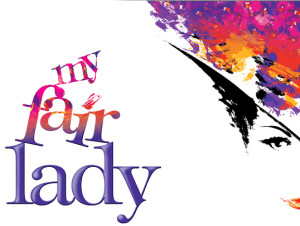By Rachel Neglia
“There’s no business like show business!” proclaims the familiar song from Irving Berlin’s Annie Get Your Gun. “Everything about it is appealing!” the ensemble says. But is it really? Though those preparing for a play focus on the final product, the production encompasses much more than merely the glamour of opening night. Before Tempe Prep’s interpretation of My Fair Lady will premiere in mid-April, it is important to recognize the cast’s hard work leading up to the performance.
 My Fair Lady, based on George Bernard Shaw’s play Pygmalion, originally premiered on Broadway in 1956. It involves the story of Eliza Doolittle (played by Jacquelyn McIntosh), a poor cockney flower girl who takes speech lessons from professor Henry Higgins (Connor Will) so that she can fit in with high-class society. “It has a very unique love story, which I think plays a big role in making it as interesting as it is,” Connor says. “But most importantly, it’s a very clever musical and the writing is funny, especially because of the chemistry between the characters.”
My Fair Lady, based on George Bernard Shaw’s play Pygmalion, originally premiered on Broadway in 1956. It involves the story of Eliza Doolittle (played by Jacquelyn McIntosh), a poor cockney flower girl who takes speech lessons from professor Henry Higgins (Connor Will) so that she can fit in with high-class society. “It has a very unique love story, which I think plays a big role in making it as interesting as it is,” Connor says. “But most importantly, it’s a very clever musical and the writing is funny, especially because of the chemistry between the characters.”
According to Mr. Sanderson, the director, a prospective school play must fit several criteria. “…Since TPA is a Great Books curriculum, we prefer it to be a classic musical,” he explains. It also must be economical, family-friendly, and enjoyable for the students whose enthusiasm carries the production. My Fair Lady fits all of these criteria, and was thus chosen to be performed.
At first, bureaucracy got in the way. Before a cast performs any play, it must be granted the play’s licensing rights. “We were actually initially denied the rights to My Fair Lady, which was very upsetting since Dr. Wolfe, Mrs. Wilkison, and I had been hoping to do this production since early 2014,” Mr. Sanderson recounts. Later, the licensing company inexplicably granted him the rights to the play.
After this minor setback, the real preparations for the show could begin. “We need[ed] to get a lot of people involved,” Mr. Sanderson explains. He and Mrs. Wilkison not only held auditions to set the musical’s cast, but also needed to find a choreographer. Fortunately, many parent volunteers also assist the producers in completing the most “stressful” aspect of the production – assembling the “sets, props, and costumes.”
P.J. Carmody, who plays Colonel Hugh Pickering, highlights a tremendously important part of any musical – the actors – when he explains that “it’s the actor’s passion put into a character that makes the audience feel immersed.” Character development requires that actors study in order to master their character’s given circumstances, and this can encompass much of the preparation process.
“I think the most important thing to do is consider your character’s emotional state, in order to play them more accurately,” Jacqueline McIntosh says. Along with understanding characters’ emotional circumstances, actors must imitate them physically. “Everyone in the cast must learn at least one, if not two, dialects for the show,” Jacqueline explains.
“Despite being pretty long, rehearsals are actually a lot of fun. I would recommend that everyone be in a production at some point or another in life, just to offer a new perspective,” she says.
TPA does not have the budget to produce multiple performances in a school year, but this certainly does not hamper our school’s creative output. Even the tradition of performing a musical, rather than a play, every year demonstrates the school’s model, which seeks to practice all of the fine arts. “The unique thing about musical theatre is that it incorporates features of all the other arts,” P.J. explains. “From acting to poetry, from choral pieces to dance numbers, there is no end to the amount of inspired creativity that can go into one musical.”
Tempe Preparatory Academy’s interpretation of My Fair Lady is still in the works, but in April, as Jacqueline puts it, “You won’t be disappointed!”
